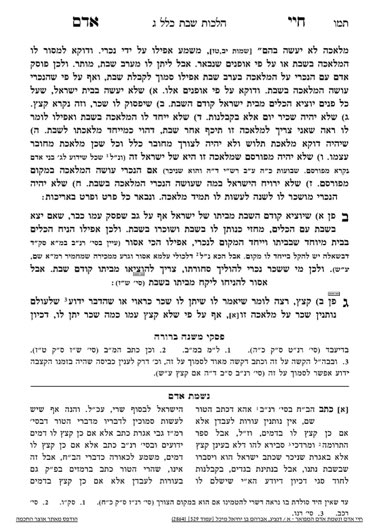We are continuing in siman 1. We learned that the Chayei Adam writes there will be situations in which it is muttar to have a non-Jew perform work for a Jew on Shabbos, dependent on eight conditions. Some of these conditions are related to the problem of the instruction from the Jew to the non-Jew, and some are an issue of maris ayin. We mentioned that there are two elements to maris ayin. The first is the appearance of impropriety, meaning the appearance that the non-Jew was instructed to perform melacha for the Jew. The second is that even if the Jew does not appear to be doing anything assur (by having the non-jew work for him), the very perception of seeing the situation undermines the purpose of the takana of Chazal against amira l’akum. It could lead to undermining the sanctity of Shabbos, which, in turn, could lead in turn to a chilul Shabbos.
The Chayei Adam writes that one can arrange for a non-Jew to perform melacha on Shabbos, even right before Shabbos, even though the Jew is sure the non-Jew will perform the melacha on Shabbos. However, the arrangement must meet eight criteria:
The work cannot be done in the home of any Jew, and any tools or materials needed from the Jew must be removed from the Jew’s home before Shabbos. If the non-Jew takes the materials on Shabbos, we are concerned that it appears as though the Jew gave the instructions to the non-Jew on Shabbos itself.
The arrangement must be that the non-Jew is paid. When the non-Jew is paid, his main focus is on the money, but when doing the work for free, the main focus is doing a favor for the Jew. When he is working for free, there is a much stronger connection to the Jew so we have the concern of shlichus.
The non-Jew must be a kablan. There are multiple halachic job types. One of them is kablanus, which means that the person is hired out for the job, rather than hired out per hour or per day. When the kablan undertakes the job, they are considered working for themselves, because they are working for the job, and once they finished the job, they are done. When one is hired on a salary, there is a much stronger connection to the employer, because their work is dependent on the employer.
Summary
Amira l’akum is the prohibition against instructing a non-Jew to perform melacha on Shabbos. Nevertheless, there are times when it will be muttar, dependent on eight conditions. The first three are:
The work cannot be done in the home of any Jew, and any materials must be removed from the home of the Jew before Shabbos.
The non-Jew must be paid
The non-Jew must be a kablan



